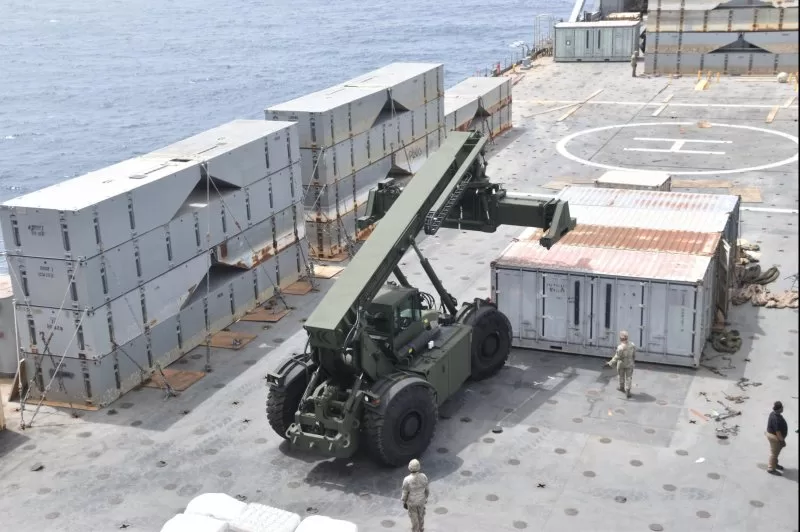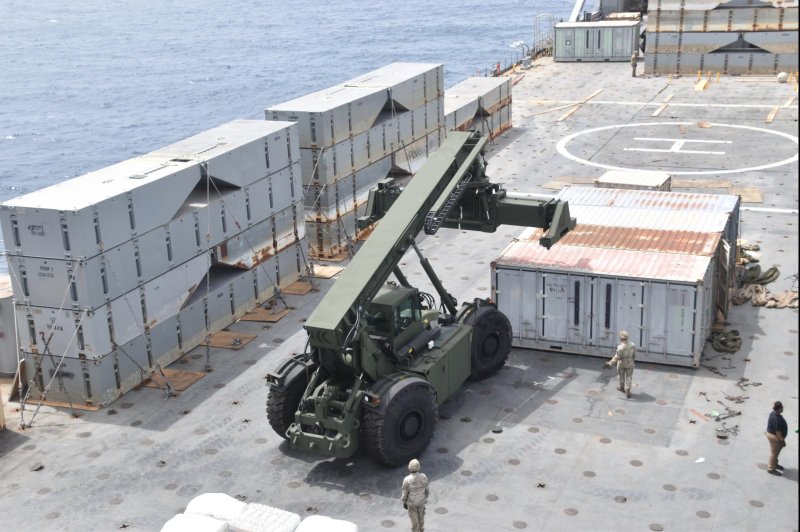Troops attached to the U.S. Army’s 7th (Expeditionary) Transportation Brigade anchored a temporary pier to the beach in Gaza early Thursday as an amphibious mission to deliver additional humanitarian aid to Palestinian civilians by sea gathered pace in the eastern Mediterranean Sea. Photo courtesy U.S. Department of Defense
May 16 (UPI) — American logistics troops anchored a temporary pier to the beach in Gaza early Thursday as an amphibious mission to deliver additional humanitarian aid to Palestinian civilians by sea gathered pace in the eastern Mediterranean Sea.
United States Central Command personnel attached the structure to the shore at around 7:40 a.m. local time with trucks carrying humanitarian assistance expected to begin rolling off the pier onto the beach within days, CENTCOM said in a post on X in which it stressed there had been no U.S. boots on the ground.
“As part of this effort, no U.S. troops entered Gaza,” it said, stressing that the aid aboard trucks due to begin moving ashore in the coming days would be received by the United Nations which would coordinate its distribution into Gaza.
Addressing a special online briefing live-streamed from London on Wednesday, CENTCOM Deputy Commander Brad Cooper hammered home the Biden administration’s message that the sole purpose of the pier was to get humanitarian assistance to the people of Gaza by sea, emphasizing that it was in tandem with deliveries by land and air aimed at “flooding” the strip with aid and “has no other purpose.”
“The pier is temporary in nature. The maritime route, as was mentioned, is additive and is not meant to replace land routes into Gaza,” he said.
“The U.S. military’s only role in this effort is to provide our unique logistics capability to enable the delivery of lifesaving humanitarian aid to the people of Gaza by USAID and our international partners,” Cooper said noting that 14 U.S. and partner ships would be involved in funneling aid via the humanitarian maritime corridor.
Cooper heaped praise on the army engineers who completed building the floating pier last week from components shipped 6,800 miles from the East Coast of the United States for assembly off the Gaza coast, also thanking Britain for deploying a Royal Fleet Auxillary logistics ship to the effort.
Explaining the workings of the Joint Logistics Over-the-Shore operation, Cooper said that aid into Cyprus, via air or sea, would be screened, and palletized prior to being transhipped aboard large commercial or military vessels to a large floating platform several kilometers off the coast of Gaza.
The platform acts as a quay to offload aid from the larger commercial ships onto smaller U.S. military vessels which then shuttle trucks loaded with aid to the temporary pier — a floating causeway several hundred meters long fixed to the beach.
The trucks drive along the pier and drop off the aid on land in a roll-on, roll-off operation that is repeated over and over, Cooper explained.
He cautioned that protection of U.S. forces was a top priority with an integrated security plan drawn up with Israel to “protect all the personnel who are working at the JLOTS emplacement in the surrounding area, which we call the marshaling yard.”
“We take the security of our service members and the humanitarian aid workers very seriously. As a point of emphasis, this is a 100% humanitarian mission and any attack on those working on it, on this mission, is an attack on aid for the people of Gaza.”
Cooper said CENTCOM would continually assess and reassess security to inform the operation on aa daily basis.
“We are confident in the ability of this security arrangement to protect those involved, and although I won’t be able to talk specifics on what exactly that looks like, it’s a very comprehensive effort,” he said.

